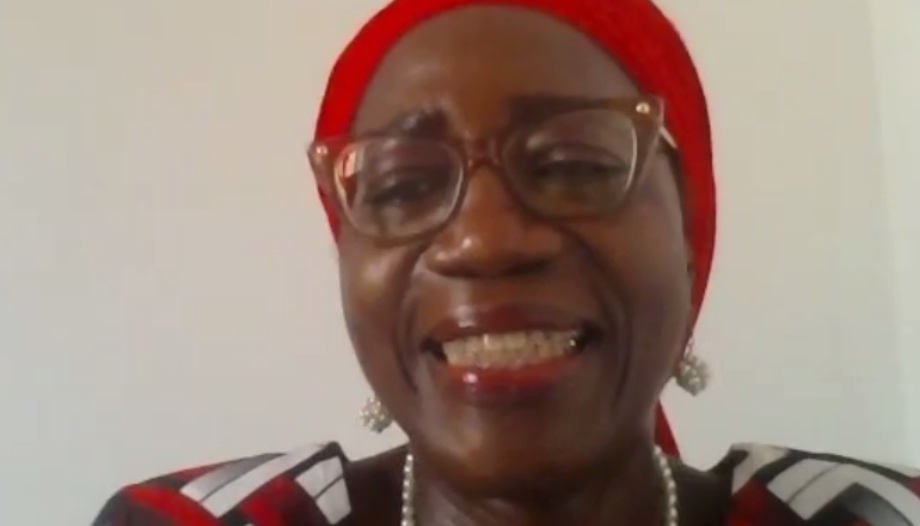Dr. Duni Sawadogo described part of the work that has earned her the Harambee Award for the Promotion and Equality of African Women, in a virtual press conference held this morning, in which she highlighted her interest in facilitating and promoting access to scientific university education among women in her country.
The president of Harambee, Antonio Hernández DeusDr. Sawadogo "has broken a ceiling of steel rather than glass by winning her chair in Hematology and, even more, by forming a research team with other women, opening the way for women to access science in her country. Sawadogo opens a path with her work and her example and even more with her desire to help other people".
From the laboratories Pierre Fabresponsors of the Award, Nicolas Zombre highlighted the unity in the values that unite these laboratories and their foundation with the NGO Harambee, whose awards they have been sponsoring for the last 5 years. He also emphasized the important work of Dr. Sawadogo, especially in the fight against the trafficking of counterfeit medicines, one of the scourges against which this Foundation works in the country through the financing of medical centers and the training of people.
"Getting an education changed my life."
The winner of the Harambee Award, Duni SawadogoIn her presentation, she presented three key points of the African reality in which she works: the limited access of women to higher scientific education, the problem of illegal trafficking of counterfeit medicines and the incidence of sickle cell disease in the African population.
Sawadogo began by pointing out that "In Africa it is very easy to realize how lucky it is to be born into one family or another. In the same street there are shacks and mansions. My parents were intellectuals and I had no difficulty getting an education. When I saw girls selling fruit, which they carried on their heads, on the roads, I asked myself 'why not me, why have I been so lucky'.
The first female professor of hematology in Côte d'Ivoire is clear on this point: "the simple fact of receiving an education changed my life.
According to the data, only 7.6% of women in Côte d'Ivoire have access to a university education. Faced with this reality, Sawadogo decided "to do everything I could with what little I had to help women pursue a scientific career. To do this, I had to become a better professional myself. I entered a scientific competition and came first in the pharmacy section and became the first female professor in my country.
After this, she began to form a team of professionals: "I wanted them to be women, which meant more work on my part. I wanted them to be women, which meant more work on my part. I also had to find a host laboratory, scholarships, give lectures...". A task that had a very clear basis: "I had to teach everything I had learned without hiding anything. I made the girls who worked with me aware of their abilities, but I also made demands on them".
All this, he recalls, knowing that he had to "redirect" many of his students' stagnant attitudes: "One day, the class had already started and a student arrived who was Muslim. I asked her why she was late and she replied that she had gotten married. I realized that I had two possibilities: to tell her that the professional future was more important but it would have made her feel bad, so I asked the class to applaud her because marriage was very important and that encouraged her to come to class".
Fake medicines and sickle cell disease
Dr. Sawadogo also referred to the widespread problem in Africa with the sale, consumption and trafficking of counterfeit medicines. The WHO estimates that some 300,000 children under 5 years of age die each year in Africa as a result of these fake or low-quality medicines. Added to this is the lucrative business of trafficking in these fake medicines, which generate "20 times more money than heroin".
Finally, Dr. Sawadogo explained the incidence of sickle cell disease, a pathology characteristic of the black race that affects some 300 million people in the world and which, without adequate treatment, leads to high infant mortality.
Dr. Sawadogo's "dreams".
Dr. Sawadogo said goodbye by sharing her "dreams" for the future of Africa. A future of peace and equality, a future that does not force her compatriots to risk their lives crossing the Mediterranean to have a decent job and a future in which "I can work here in Africa in a laboratory like those I have known in Europe". He also stressed that the work with women around the world is key because it is they who "give life to humanity and humanity to life".





 "More than 300,000 children die each year in Africa from fake medicines."
"More than 300,000 children die each year in Africa from fake medicines."





